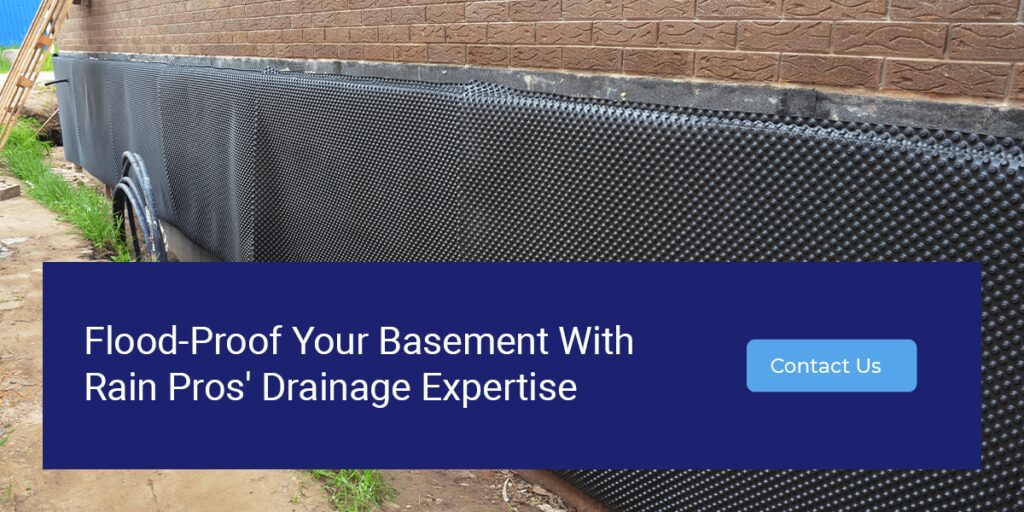8 Common Causes of Basement Flooding and How to Prevent Them
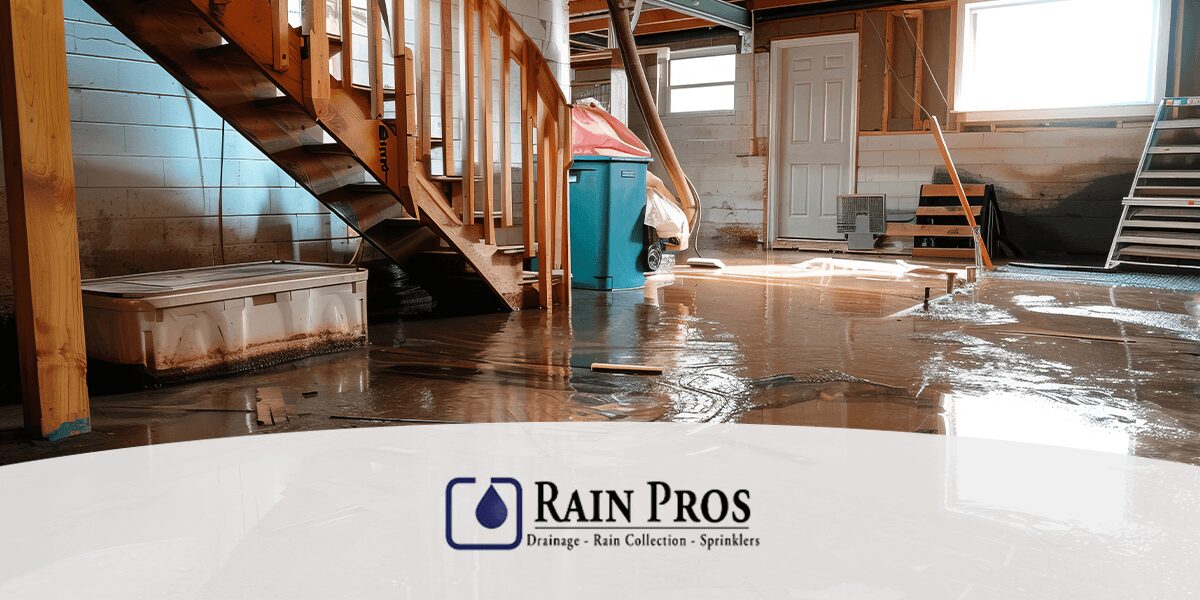
Basement flooding is a common concern for homeowners, and with good reason — the safety and comfort of yourself and your family depend on it. To keep your basement dry and your belongings in good condition, it’s important to recognize the signs of a leaky basement and why it could happen. In this definitive guide, we’ve listed eight of the most frequent causes of basement flooding and what you can do to prevent them.
1. Hydrostatic Pressure
Hydrostatic pressure is when water from the soil around your foundation pushes through the concrete and into your basement. This happens because the soil around the foundation was dug up and made active when your house was built. The active soil surrounding your basement is far less dense than the undisturbed soil around it, creating what is known as the clay bowl effect.
When it rains, snow melts or the water table rises, moisture runs through channels in the dense outer soil and then pools in the more porous, loose soil surrounding your foundation — the “clay bowl.” This water can then seep through several areas of the basement’s foundation, causing flooding. The point where the concrete wall and the concrete base of the foundation meet, known as a cold joint, is a prime area for water to be pushed through. Because concrete is porous, however, hydrostatic pressure can even force water through the solid floor itself.
How Do You Prevent Hydrostatic Pressure From Flooding Your Basement?
Exterior drains should be built into your home’s foundation to relieve pressure on the concrete, although many houses do not have this feature. Once a house is built, installing an interior draining system such as a basement channel drain is the best way to prevent basement floods by moving and distributing any intruding water.
2. Foundation Cracks and Leaks
If your home’s foundation is cracked, water from outside and underground could seep through the crevices and flood your basement. Water will most likely enter your basement through foundation cracks during or after heavy rainfall or when the water table rises. The cracks in your foundation are often caused by the hydrostatic pressure in the ground pushing up against your basement’s concrete floor and perimeter. A small leak can have a major financial impact if not dealt with immediately.
How Do I Identify and Fix Foundation Leaks?
To find out if your water intrusion is because of a leaking foundation, search the entire basement for cracks and crumbling in the walls and floor. If you don’t find any, look for irregular patterns on the concrete — this could be evidence of a previous crack patch-up that isn’t holding up. Simply plastering over cracks is a temporary solution to flooding and doesn’t address the main cause. You’ll need to install a drainage solution to prevent the source of the cracks and have existing cracks filled with strong epoxy.
3. Sump Pump Failure
One solution to basement floods is a subfloor water drainage solution known as a sump pump. Sump pumps collect water around the perimeter of the basement and pump it outside, away from the home. If your sump pump is not working as it should or has shut off completely, your basement could fill with water.
Sump pumps can fail for several reasons, ranging from an easy fix to a call to the professionals. These include:
- Power failures: A problem with your outlet, a blackout or a chord breakage could stop electricity from powering the pump.
- Aged or damaged mechanisms: If moving parts within the pump rust or break down, it will become less efficient over time and eventually stop working.
- Malfunctioning float switch: If the float switch gets stuck in the “on” position, the pump could burn out, and if it’s stuck in the “off” position, water will not drain outside.
How Do I Fix My Sump Pump?
If you’ve ensured your sump pump is getting the electricity it needs to run, you’ll need to replace the broken part, whether it’s the float switch, fan or chord. Contact a professional to ensure you’ve correctly identified the part that needs replacing and have them install a new one for best results.
4. Poor Drainage Systems
A reliable and appropriate drainage system protects your home from water damage. Several kinds of drainage systems work together to collect and carry water away from the house. Types of drainage options include simple French drains that remove excess surface water and channel or trench drains that prevent outside areas from becoming waterlogged. The most important drainage systems to prevent basement flooding are foundation drains that protect against hydrostatic pressure.
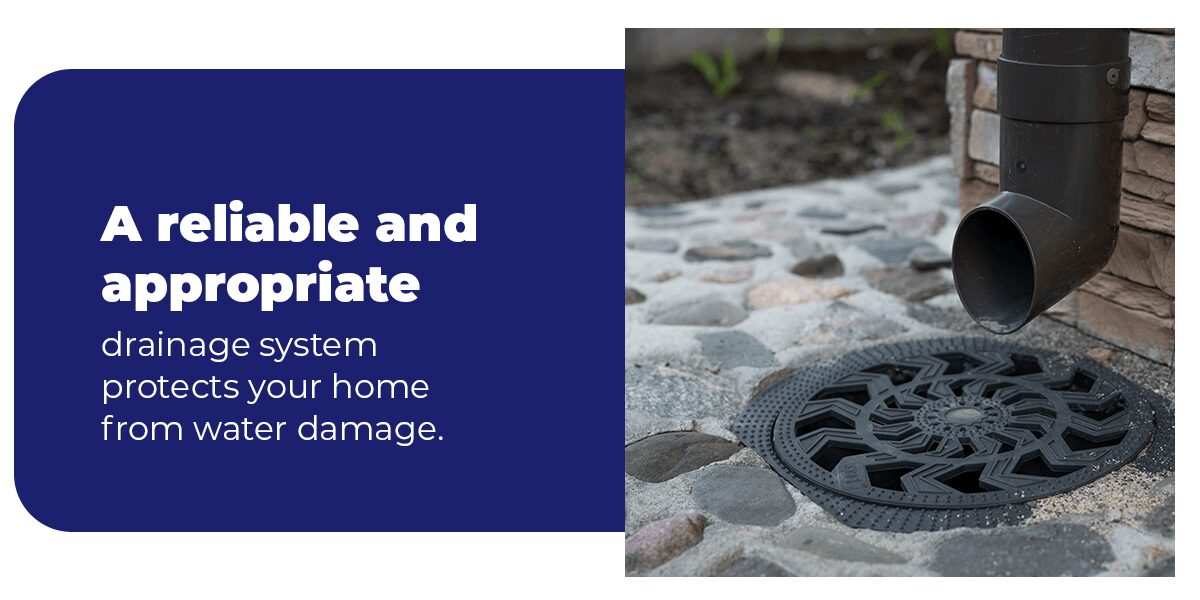
Post-construction foundation drains are installed along the side walls of your basement, a few inches below the floor. When underground water levels rise, the pipes carry it toward either a sump pump or a storm sewer. This protects the concrete from moisture and prevents water intrusion.
5. Surface Water Runoff
Without a proper downspout drainage system to collect and redirect rainwater from your roof, moisture could run down the sides of your home and lead to a flooded basement. Even well-installed, high-quality downspouts can become overwhelmed by torrential downpours or clogged with debris.
How Do I Avoid Surface Water Runoff?
Ensure you have a capable and experienced team of professionals install your water runoff drainage system. Regular clearing and maintenance of your downspouts can help avoid any overflow and keep your home dry.
6. Sewer Backup
A wet basement can also signify a blocked or overflowing sewer, either the municipal line or the one in your home. Overflowing wastewater will spill out in your basement if this happens because that’s where the lowest point of your plumbing system usually sits.
How Can I Prevent a Flooded Basement From Sewer Backup?
You can prevent sewer-backup basement floods by having professionals do regular maintenance on your drains and plumbing, install backflow valves and ensure proper grading around the property.
7. Improper Sealing of Windows
Sometimes, a flooded basement can come down to something as simple as improperly insulated windows. Many basements have windows at ground level, and if your exterior is not set up to drain water away from the house during rainfall, the pooled water can leak through the unsealed window frames.
How Do I Prevent Water Intrusion From Outside?
Ensure that all perimeter walls are watertight, including window fittings and ventilation equipment, and speak to a professional about French or channel drains for outside.
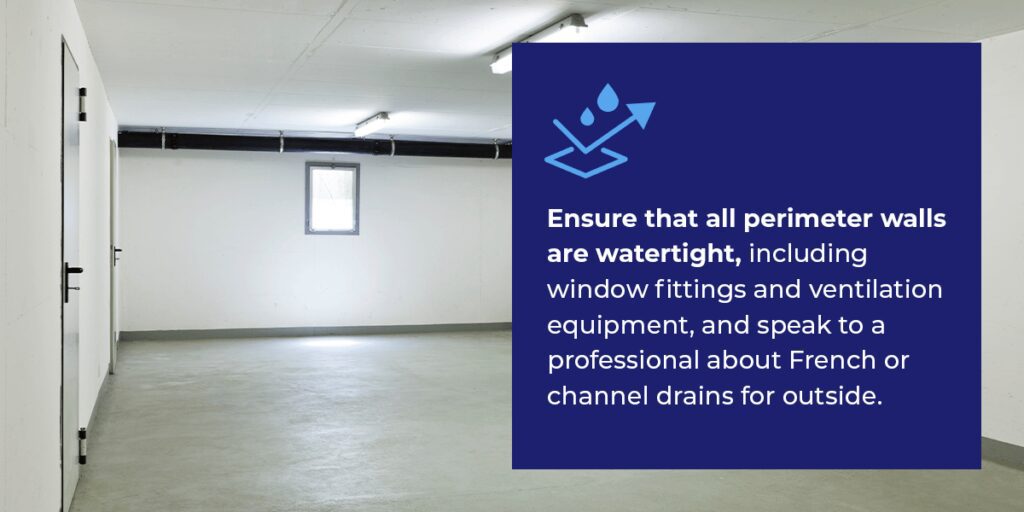
8. Burst Pipes
Water pipes can burst because the water inside them has frozen, they have deteriorated with age, the water pressure is too high or they’ve been damaged by trauma or corrosion. When a water pipe bursts, a large amount of water empties quickly into the space, unlike other leaking causes, which happen more gradually. Immediately shit off the water supply and contact professional help if this happens.
How Can I Prevent Basement Floods From Burst Pipes?
To help prevent burst pipes, you can:
- Maintain proper and consistent water pressure.
- Regularly inspect pipes for damage.
- Insulate pipes in cold areas to prevent ice.
Tips to Prevent Basement Flooding
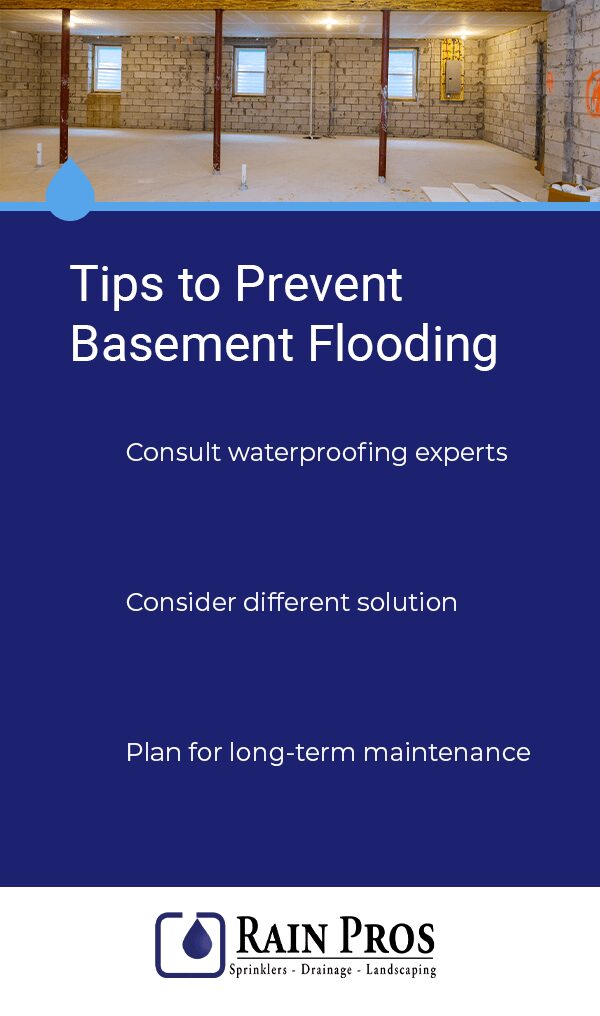
Here are a few ways to keep your home dry:
- Consult waterproofing experts: Experts in the field have the tools and knowledge to perform basement waterproofing services that address both interior and exterior issues.
- Consider different solutions: Simple fixes like adding gutters are sometimes sufficient to divert water from your foundation and keep it out of your basement. However, you may need a sump pump, an enhanced drain system or another solution to prevent flooding.
- Plan for long-term maintenance: Some installations need periodic upkeep services so they can continue to keep your home safe and dry.
Reviewing your homeowner’s insurance policy and confirming whether you’re covered against interior flooding is also wise.
Flood-Proof Your Basement With Rain Pros’ Drainage Expertise
When it comes to water intrusion, the right contractor can make all the difference. At Rain Pros, we stand out as industry leaders. We offer proven expertise in diagnosing the root cause of the water entering your home, and we can perform a wide range of interior and exterior services to correct and prevent the issue.
Contact the Rain Pros team today for more on our water intrusion solutions.

